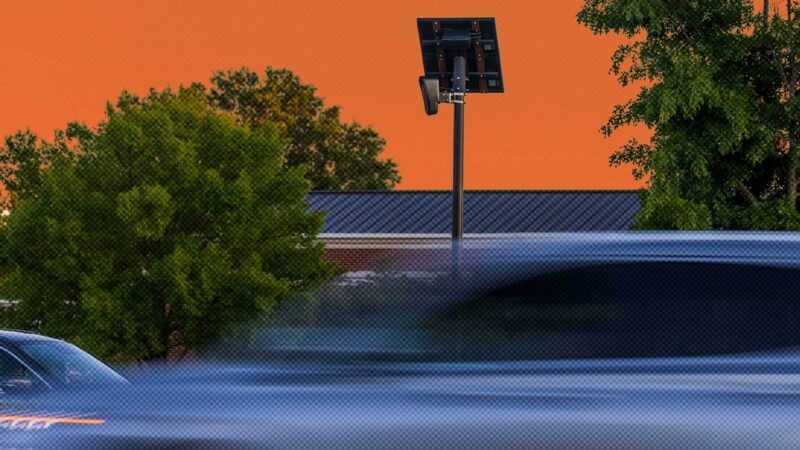Illinois Cops Gave ICE Access to More Than 5,000 Surveillance Cameras Nationwide
A camera network developed to help find missing cars and persons is now being used for immigration enforcement.

A public records request from the Danville, Illinois, police department obtained by 404 Media revealed that local and state police around the country searched automatic license plate reader (ALPR) camera data more than 4,000 times for immigration related reasons between June 1, 2024, and May 5, 2025. Despite an Illinois law prohibiting the use of ALPR data for immigration enforcement, these records suggest that Immigration and Customs Enforcement (ICE) has informally gained access to camera networks across more than 5,000 communities nationwide.
The technology provider in question, Flock Safety, has over 40,000 ALPR cameras across the United States that use artificial intelligence to constantly record the plates, color, and make of passing vehicles. The cameras can also register unique features of vehicles like missing hubcaps. The data is kept for 30 days and can be searched to find a vehicle, and by extension, a person.
Flock markets its services as a solution for combating crimes like carjackings or finding missing persons. The company claims to help solve an average of over 2,200 crimes per week using its technology.
According to the Flock Safety User Guide, once a law enforcement agency, like the Danville Police Department, joins the Flock family, officers can not only search data from its specific community's cameras but also access the data of users across the nation "who are also opted into the National Lookup" capability. But it's not just police departments making up the Flock network. Major companies, neighborhood homeowner associations, and affordable housing communities also use the technology, and can share data.
But this expansive system is now capable of tracking drivers' movements and patterns, and providing real-time alerts of a license plate's location across the U.S.—typically without a warrant or court order.
Without proper oversight, this network amounts to mass government surveillance of American citizens. Currently, the warrantless search of ALPR data by local law enforcement is being challenged as unconstitutional by the Institute for Justice for violating the Fourth Amendment's protections against unreasonable searches and seizures, and warrantless government surveillance.
And now there may be even more concern for Americans' privacy as evidence suggests that ICE, which does not have a formal contract with Flock, has gained side-door access to local and state law enforcement's ALPR camera data.
When accessing the Flock's system data, officers must note a "reason" behind each search. Records revealed 4,000 searches with "ICE," "ICE+ERO" (ICE's Enforcement and Removal Operations), "illegal immigration," "ICE WARRANT," or more broadly "HSI" (for Homeland Security Investigations) listed as the reason. After speaking with 404 Media, Illinois officers said that some of the searches in question were for informally assisting or providing a favor to federal agents. One police chief told 404 Media that he did not know what a search performed by a department's officer embedded in the Drug Enforcement Administration was for—even though the "reason" read "immigration violation."
Danville's mayor, Rickey Williams Jr., denied that the records indicate Danville police searching data or acting at the behest of another agency, including ICE. "As required by the State of Illinois we ensure that we will not use LPR data or enforce a law or relate a person's immigration status," Williams Jr. told 404 Media. Illinois prohibits police from sharing ALPR data for immigration enforcement. Some other states and law enforcement agencies have also codified similar restrictions. Regardless, Flock's very own policies prohibit its cameras from being used for immigration enforcement.
But as the search records and 404's investigation show, searches of Flock's ALPR data are, in fact, being informally shared with federal agencies for immigration purposes. Importantly, this is happening without a public discussion on what data federal agencies should and should not be able to access.
"I assume there's a fair number of community residents who accept giving police the power to deploy license plate readers to catch a bank robber, who would absolutely gag on the idea that their community's cameras have become part of a nationwide ICE surveillance infrastructure," Jay Stanley, senior policy analyst at the American Civil Liberties Union's Speech, Privacy, and Technology Project, told 404 Media. "And yet if this kind of informal backdoor access to surveillance devices is allowed, then there's functionally no limits to what systems ICE can tap into with no public oversight or control into what they are tapping into."


Show Comments (34)